hankyoreh
Links to other country sites 다른 나라 사이트 링크
Remembering Lee Dong-woo, a fierce advocate for “comfort women” in the US
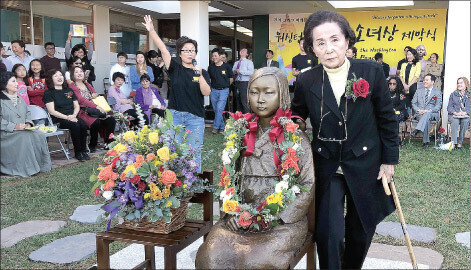
I was visiting Korea to make arrangements for the estate of my mother, who had passed away unexpectedly this past spring, when I learned another piece of heartbreaking news. Lee Dong-woo, who had been my comrade in grassroots organizing for the not-insignificant length of time of 14 years, had passed on to heaven. Having heard she was unwell before my trip, I had intended to visit her at her home in Tampa, Florida, but time had not been on my side.
The last time I saw Lee was in October 2019, during an unveiling ceremony for the Statue of Peace installed in Annandale, a Koreatown in Washington, DC. I remember like it was yesterday, how she made her congratulatory remarks with a cane in one hand, saying how proud she was of activists who had come after her.
In 2017, I also visited her home to take a look at her “mini archive,” as she called it, where she had compiled records of her activities. Even then, she demonstrated her passion and resolve to make a proper film dealing with the “comfort women” issue by talking about getting her interview tapes of “comfort women” victims into order.
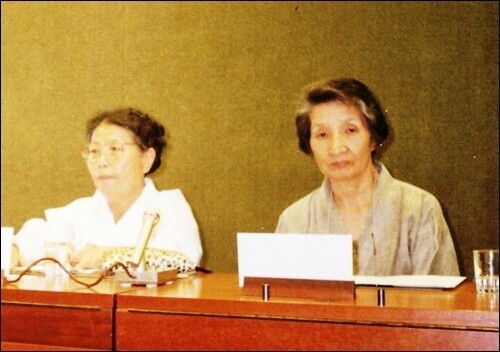
Lee’s activism occupies an important place not just in her personal life but in Korean American history. Especially, the Washington Coalition for Comfort Women Issues, or WCCW, which Lee founded using her personal funds, holds a great amount of historical significance as the first successful citizens’ movement brought about through the collaboration of Korean compatriots scattered across the US.
A mother of three children, Lee cultivated her family life dearly while breaking the glass ceiling and making a career at the World Bank as a first-generation immigrant, at the same time devoting herself to ministry as a church elder. But her most significant commitment was to the issue of the “comfort women” system of sexual slavery by the Japanese military, which she plunged head-first into around the time she turned 60. She readily gave up the prospect of a stable life on a pension, leaving the World Bank through early retirement and dedicating her severance pay to resolving the “comfort women” issue.
The movement for the human rights of “comfort women” victims began in the US in November 1992, when the late Hwang Geum-ju (1922-2013) visited the North American country. Hwang testified about her ordeals at the Korean United Methodist Church of Greater Washington, which was subsequently broadcast on Fox 5 news. The DC area was hit by the revelation of the history of wartime sexual slavery by the Japanese military “like an explosion,” as Lee used to say.
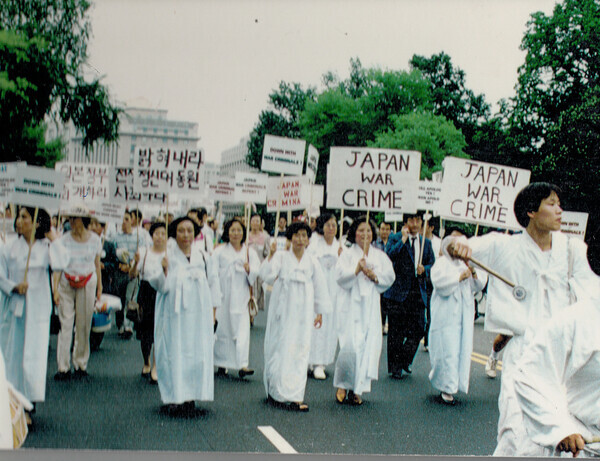
The church’s evangelism group for women had organized Hwang’s visit and pupils of professors Lee Hyo-jae and Yun Chung-ok of Ewha Womans University, the founding presidents of the Korean Council for the Women Drafted for Military Sexual Slavery — now known as the Korean Council for Justice and Remembrance for the Issues of Military Sexual Slavery by Japan, or simply Korean Council. In a sense, the seed of awareness for women’s rights that had been sowed at the Ewha Hakdang school during the 1920s and ‘30s had borne flowers and fruits across the Pacific.
On Dec. 12 of 1992, a month after Hwang’s testimony, Koreans in America founded the Washington Coalition for Comfort Women Issues, registering it as a non-profit organization with the US federal government. Founding members of the coalition selected Lee, a woman who could speak English, Korean, as well as Japanese, as their inaugural president.
Lee said that she felt an urgent calling only that generation who had seen and heard about the Japanese colonial period and experienced the Korean War in the 1950s could feel when she learned about the “comfort women” issue. The social inequality born of Korean patriarchy and the prejudices of Japanese imperialism, colonialism, and militarism had overlapped with the discrimination and oppression immigrants of color faced in America, prompting greater empathy for the cause.
As the WCCW’s inaugural president, Lee’s first mission was to raise awareness about the “comfort women” issue within US society at large. It would be especially important to bring awareness to the issue among people with influence, people in positions to engage with the Japanese government — in other words, federal lawmakers as well as bureaucrats in the Department of Justice and Department of State.
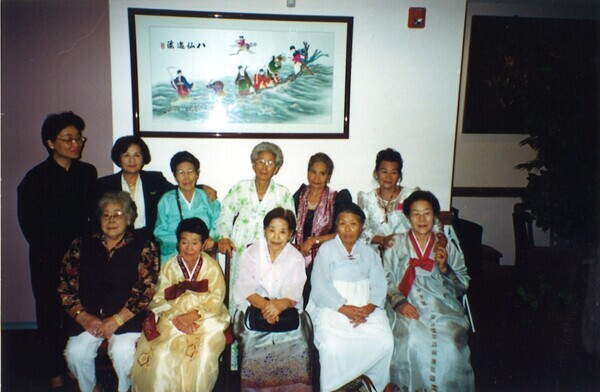
Lee made use of any and all grassroots organizing methods known to man, leading efforts to help voters exercise their rights: writing letters to congresspeople, making visits, organizing forums or exhibits, organizing large-scale protests and rallies, publishing, and holding press conferences. Lee invited “comfort women” victims to the US and organized tours for them to make public testimonies all across the country, also creating videos of interviews, booklets, and archival material.
Based on materials the WCCW submitted, Eli Rosenbaum, the director of the Department of Justice’s Office of Special Investigations at the time, even named 16 individuals as Japanese war criminals, barring them from entering the US.
One of the most meaningful fruits of the WCCW’s activities was the adoption of House Resolution 121 at the US House of Representatives in 2007. The resolution was the culmination of 15 years of grassroots organizing starting in 1992, and the result of joint efforts by numerous individuals, including members of the WCCW.
I would dare say that the first to sow the seed for that fruit was none other than WCCW inaugural President Lee Dong-woo. Of course, the courage and resolution of “comfort women” victims preceded Lee’s efforts, and members of the Korean Council and others also spearheaded the “comfort women” movement in Korea.
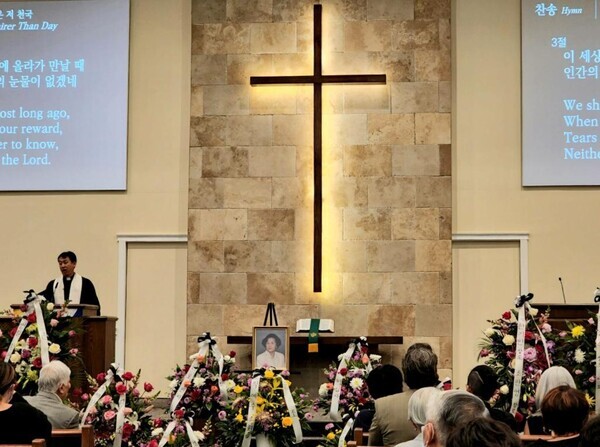
Now a major issue within the international community beyond the US, the “comfort women” issue is at once a human rights movement and a women’s rights movement as well as a movement born of a longing for a democratic and equal society. The history of the “comfort women” movement, which began as a shout in the US, has now entered a new chapter, burning brightly in various shapes and forms. This has all been possible thanks to the first action taken by that somebody, Lee, and I look forward to the movement evolving into new paradigms.
I can still hear Lee’s voice as she talked to me when we were invited to the Holocaust Museum in New York in 2016. During our train ride together, she explained that a museum and an archive dedicated to the “comfort women” issue should also be established in the US, which sounded to me, then serving as the president of the WCCW, like a great calling.
However, as an all-volunteer organization without a single full-time employee, the WCCW could not accomplish this goal on our own. We were barely able to record the history of the “comfort women” movement in the US in a single book and produce one documentary film. I can only hope that the project, one of Lee’s greatest wishes and now no longer mine, can be made a reality by activists of the younger generation.
By Lee Jung-sil, chair of the Washington Coalition for Comfort Women Issues
Please direct questions or comments to [english@hani.co.kr]

Editorial・opinion
![[Correspondent’s column] The real reason the US is worried about Chinese ‘overcapacity’ [Correspondent’s column] The real reason the US is worried about Chinese ‘overcapacity’](https://flexible.img.hani.co.kr/flexible/normal/500/300/imgdb/original/2024/0510/5217153290112576.jpg) [Correspondent’s column] The real reason the US is worried about Chinese ‘overcapacity’
[Correspondent’s column] The real reason the US is worried about Chinese ‘overcapacity’![[Editorial] Yoon’s gesture at communication only highlights his reluctance to change [Editorial] Yoon’s gesture at communication only highlights his reluctance to change](https://flexible.img.hani.co.kr/flexible/normal/500/300/imgdb/original/2024/0510/7717153284590168.jpg) [Editorial] Yoon’s gesture at communication only highlights his reluctance to change
[Editorial] Yoon’s gesture at communication only highlights his reluctance to change- [Editorial] Perilous stakes of Trump’s rhetoric around US troop pullout from Korea
- [Guest essay] Preventing Korean Peninsula from becoming front line of new cold war
- [Column] The state is back — but is it in business?
- [Column] Life on our Trisolaris
- [Editorial] Penalties for airing allegations against Korea’s first lady endanger free press
- [Editorial] Yoon must halt procurement of SM-3 interceptor missiles
- [Guest essay] Maybe Korea’s rapid population decline is an opportunity, not a crisis
- [Column] Can Yoon steer diplomacy with Russia, China back on track?
Most viewed articles
- 1[Correspondent’s column] The real reason the US is worried about Chinese ‘overcapacity’
- 2S. Korea “monitoring developments” after report of secret Chinese police station in Seoul
- 3Nuclear South Korea? The hidden implication of hints at US troop withdrawal
- 4Yoon voices ‘trust’ in Japanese counterpart, says alliance with US won’t change
- 5[Book review] Who said Asians can’t make some good trouble?
- 6‘We must say no’: Seoul defense chief on Korean, USFK involvement in hypothetical Taiwan crisis
- 7No good, very bad game for Korea puts it out of Olympics for first time since 1988
- 8Presidential office warns of veto in response to opposition passing special counsel probe act
- 9[Editorial] Perilous stakes of Trump’s rhetoric around US troop pullout from Korea
- 10[Editorial] Yoon’s gesture at communication only highlights his reluctance to change